Articles Tagged As 40 Under 40
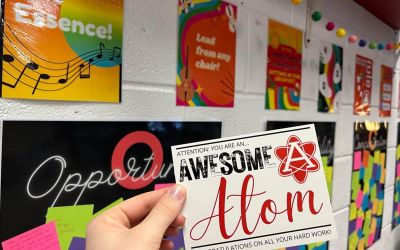
Fighting Absenteeism with the Arts
By focusing on the relationship-based approach common in the performing arts, a Virginia high school has become a top overperforming school in the district.

Building a Global Nonprofit that Advances Gender Equity
We Make Noise started as a music-production curriculum. Today, it offers global workshops, songwriting and production retreats for women, a record label, revenue sharing, job opportunities and more.

Helpful Hints for First-Year Music Teachers
The 2026 “40 Under 40” music educators offers their top three tips for new teachers.
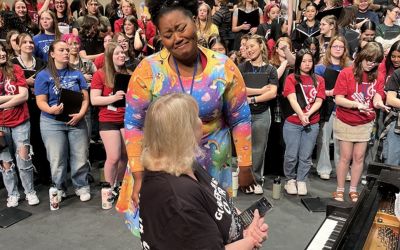
A Framework for Healing-Centered Music Classrooms
An Oregon educator’s curriculum takes a holistic approach, blending social-emotional learning with artistic rigor and student-led leadership.
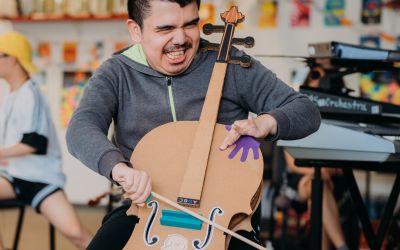
An Orchestra for Students with Disabilities
A Virginia educator creatively tailors and individualizes music education for students with significant and severe disabilities.
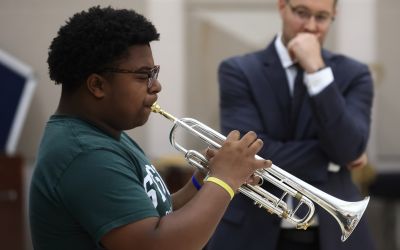
A University Trumpet Studio Fosters a Culture of Community
At Stetson University, trumpet students learn to be flexible, accountable and vulnerable while honing their musical performance skills.

Having Fun = Huge Participation Rate
A Minneapolis middle school music program boasts a whopping 70% to 75% student participation rate. Here’s how the band and orchestra director accomplished it.

Using Choir as a Tool for Belonging, Voice and Agency
Clear communication and empathy are the overriding tenets in Coty Raven Morris’ class at Portland State University.

ASU’s Popular Music Program Focuses on Access and Community
The three main goals in building the new program were an inclusive environment, an individualized approach and a collaborative community.

Five Steps to Build Brave Music Classrooms
Focus on community-centered values, authenticity and a positive atmosphere to create a safe and creative environment for students.

A University’s Community Engagement Promotes Leadership and Creativity
At Slippery Rock University in Pennsylvania, students can participate in several early childhood music education opportunities thanks to the efforts of one of their professors.
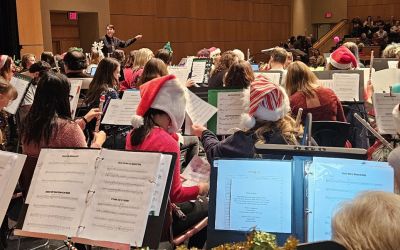
A Christmas Concert for Flutes and Piccolos
In Akron, Ohio, flute players —from students to professionals and everyone in between — get together each year to rehearse and perform a Christmas concert all in one day.
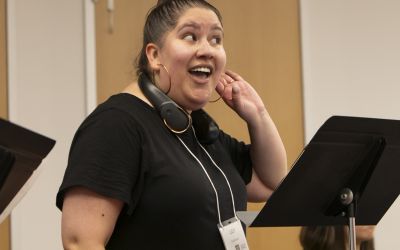
Bringing Opera to Austin Children
A professor from the University of Texas at Austin, provides a free summer program at public libraries around the city to introduce K-5 students to all aspects of opera — singing, the story, set designs, orchestra, choreography and more.

Healing from Grief with Music
Taking a people-first approach has helped an Arkansas music educator help her students and herself deal with mental health and self-care.

5 Benefits to Creating a Keyboard Orchestra
In your group piano class, use the various “voices” of a keyboard to create an orchestra of different effects and instruments.
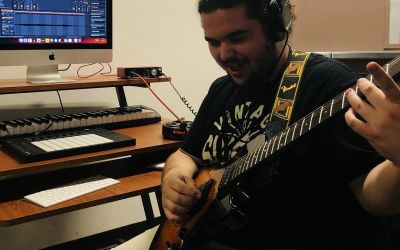
STEAM-Powered Music Technology
Expanding music horizons and empowering students are keys to an Arizona arts academy and its music technology program.

Metacognition in the Music Classroom
Help students become more aware of their thinking process as they assess their performance to become independent musicians.
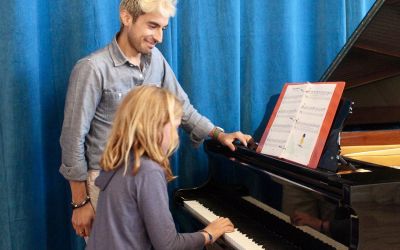
One Arm Will Do on the Piano
A music educator and composer has found a way for students with broken or injured arms continue to learn to play the piano.
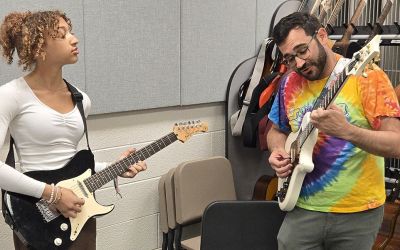
Guitar as a Solo and Ensemble Instrument
Three keys to teaching ensemble guitar in a classroom setting to students at different skill levels.
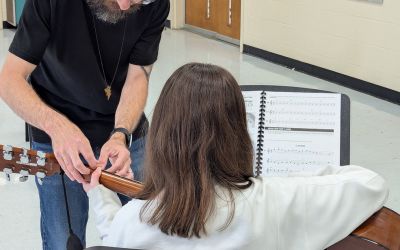
General Music for Non-Musicians
A Tennessee high school music educator designed a curriculum for students with no musical experience, and by the end of the school year, they were reading music, playing instruments and performing.

Go Viral With Purpose: Responsible Social Media Usage
What began as a reluctant step into TikTok quickly became a transformative journey that elevated my school music program, empowered my students and redefined how I advocate for music education.

Balancing Motherhood and Teaching
Two Virginia orchestra directors joined forces to help all caregiver music directors on extended leave.

Expansive Music Education
By broadening the scope of musicianship, teachers can introduce and engage more students to pursue all aspects of music-making.
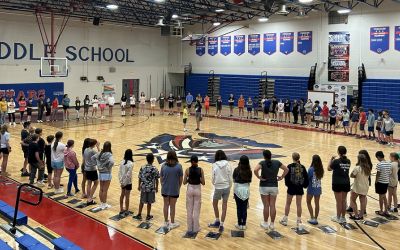
How to Start a Summer Music Camp
To successfully launch a summer camp, you must start planning at least a year in advance.
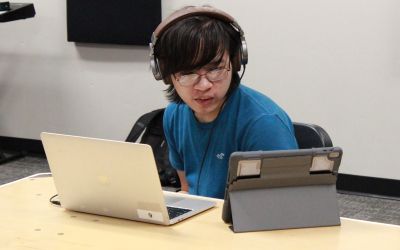
Reach Nontraditional Students
Through music technology, guitar and modern music theory courses, a Chicago music educator has bridged the gap to “the other 80%,” students who typically do not participate in traditional music programs.
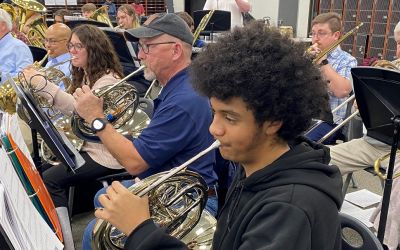
A Band for the Community
Musicians of all ages from around the Lee County, Alabama, come together to perform together as the Smiths Station Community Band.
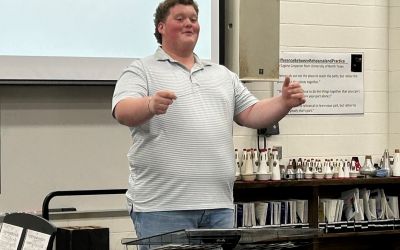
Proactively Address Teacher Shortage
You can influence and recruit your students to pursue a career in teaching music. Focus on these six key areas to foster student development in music education.

Starting a Middle School Indoor Drumline
A response to a lack of performance opportunities after the pandemic turned into an extraordinary way to help middle schoolers transition to high school band and provide leadership opportunities for high school students.
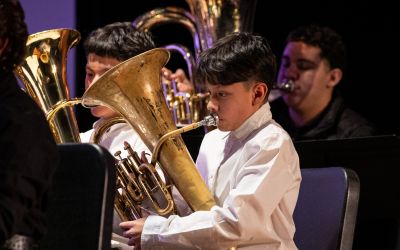
Support English Learners in Music Classrooms
Incorporate these strategies to support learning and participation by Spanish-speaking English language learners.
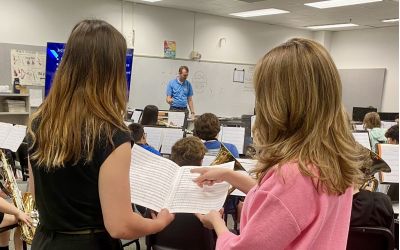
How to Recognize Good Teaching
Take preservice teachers on guided observations so they can see firsthand some key areas that make music educators successful.

Requisite Recommendations for First-Year Music Teachers
The 2025 “40 Under 40” educators offer essential tips for new music teachers to help them succeed and thrive.
Liam Keller
Back to 40 Under 40 Liam Keller Director of OrchestrasChatham High School, Lafayette Avenue SchoolChatham, New Jersey Liam Keller, Director of Orchestras at Chatham High School in New Jersey, credits his students’ “dedication, thirst for knowledge and constant chase of that next level of playing” as his driving forces. He’s always finding ways to challenge […]
Lilly Streich
Back to 40 Under 40 Lilly Streich 5-12 Vocal Music TeacherGalena Unit School DistrictGalena, Illinois Lilly Streich always knew she wanted to pursue music. She basically grew up in her father’s drum store, The Drum Pad, and remembers clinics at the store that featured some of the greatest drummers in the area. “I began taking […]
Dr. Aaron J. Witek
Back to 40 Under 40 Dr. Aaron J. Witek Assistant Professor of Trumpet, Coordinator of Brass and PercussionStetson UniversityDeLand, Florida Since Dr. Aaron J. Witek’s arrival at Stetson University in DeLand, Florida, the trumpet studio has tripled in size and has attracted top-tier talent, including all-state-level musicians. The Assistant Professor of Trumpet and Coordinator of […]
Dr. Rachel Woolf
Back to 40 Under 40 Dr. Rachel Woolf Assistant Professor of Flute The University of Texas at San AntonioSan Antonio, Texas Thanks to Dr. Rachel Woolf’s enthusiasm and creative approach to teaching, the flute students at The University of Texas at San Antonio are described as being “on fire.” Woolf fosters student success by building […]
Kim Webb
Back to 40 Under 40 Kim Webb Director of Bands Greene County Tech School District Paragould, Arkansas As Director of Bands at Greene County Tech School District in Paragould, Arkansas, Kim Webb promotes the motto “Belong, Believe, Become” with her students. “Make everyone feel like they belong. Believe in yourself and in each other. Become […]
Riley Warren
Back to 40 Under 40 Riley Warren Director of Percussion, Assistant Band Director Forney High School Forney, Texas Several years after joining the Forney High School Band staff as Director of Percussion and Assistant Band Director, Riley Warren started the Forney ISD Middle School Indoor Drumline. “The beauty of this group is that it creates […]
Dr. Andrew Stetson
Back to 40 Under 40 Dr. Andrew Stetson Director, School of MusicTexas Tech University School of MusicLubbock, Texas Dr. Andrew Stetson, the Director of the School of Music at Texas Tech University, pioneered the Music Humanities program to engage students from diverse academic backgrounds and to highlight the importance of music as an essential tool […]
Michael Schnell
Back to 40 Under 40 Michael Schnell Middle School Band TeacherOostburg School DistrictOostburg, Wisconsin Because Oostburg High School and Oostburg Middle School share the same building, Michael Schnell, the Middle School Band Teacher, proposed starting a Music Production course for high school students. “One of my favorite classes when I was in high school was […]
Annie Ray
Back to 40 Under 40 Annie Ray Orchestra Director and Performing Arts Department ChairAnnandale High School,Annandale,Virginia Orchestra Director and Performing Arts Department Chair Annie Ray launched the Crescendo Orchestra for students with significant and severe disabilities at Annandale High School in Virginia. The seeds of the orchestra started in 2017, when twin brothers with significant […]
Joshua Race
Back to 40 Under 40 Joshua Race Director of Bands Fountain-Fort Carson High School, Fountain, Colorado In Joshua Race’s classes at Fountain-Fort Carson High School in Colorado, students learn more than music — they become more aware of their own thought processes. The Director of Bands uses metacognitive strategies to help students reflect on their […]
Nicholas Popovich
Back to 40 Under 40 Nicholas Popovich Music Technology TeacherShadow Mountain High SchoolPhoenix, Arizona Paradise Valley Unified District in Arizona offers an arts academy, North Valley Arts Academies (NVAA), where K-12 students at Desert Cove Elementary School, Shea Middle School and Shadow Mountain High School can take courses in dance, theater, visual art and music […]
Kate Phillips
Back to 40 Under 40 Kate Phillips PK-5 Music TeacherGrant Avenue Elementary SchoolBronx, New York Before it was popular, Kate Phillips, Grant Avenue Elementary School’s PK-5 Music Teacher, was implementing culturally responsive lessons in her classroom. “As a white teacher originally from a suburban Midwest community, it is essential that my Bronx students engage with […]
Adam Odenwelder
Back to 40 Under 40 Adam Odenwelder Guitar Teacher Belmont Ridge Middle School Leesburg, Virginia There is no status quo for the guitar program at Belmont Ridge Middle School in Leesburg, Virginia, led by Adam Odenwelder. “I’m constantly changing things in order to meet the needs of my students in new and exciting ways,” he […]
Leah Motl
Back to 40 Under 40 Leah Motl Orchestra Teacher IJ Holton Intermediate School Austin, Minnesota The orchestra program at IJ Holton Intermediate School in Austin, Minnesota, has grown in numbers and, more importantly, in students’ passion for music. That’s because Orchestra Teacher Leah Motl encourages and motivates her students in several ways. “Praise progress often,” […]
Kevin Morrison
Back to 40 Under 40 Kevin Morrison Director of BandsLambert High SchoolSuwanee, Georgia Kevin Morrison, the Director of Bands at Lambert High School in Suwanee, Georgia, goes above and beyond to educate the community — especially potential band parents — about the school’s band program. “We use a variety of tools since most of our […]
Coty Raven Morris
Back to 40 Under 40 Coty Raven Morris Hinckley Assistant Professor of Choir, Music Education and Social JusticePortland State UniversityPortland, Oregon As the Hinckley Assistant Professor of Choir, Music Education and Social Justice at Portland State University in Oregon, Coty Raven Morris says that she “has the privilege of teaching and working with a multitude […]
Christopher McCurdy
Back to 40 Under 40 Christopher McCurdy Band DirectorUlysses S. Grant High SchoolPortland, Oregon Band Director Christopher McCurdy believes in a group-first mindset, and he vigorously advocates for it at Ulysses S. Grant High School in Portland, Oregon. “Every student deserves an accessible and comprehensive music education no matter where or when they start,” he […]
Orien Landis
Back to 40 Under 40 Orien Landis Director of BandsAmerican Fork High SchoolAmerican Fork, Utah Many people describe their programs as student-led, but at American Fork High School in Utah, the marching band is just that. According to Director of Bands Orien Landis, “Our student leadership team essentially runs the band program. During the marching […]
Shan Kazmi
Back to 40 Under 40 Shan Kazmi Director of BandsZion-Benton Township High School Zion, Illinois Working at a Title I school like Zion-Benton Township High School can be challenging, but Director of Bands Shan Kazmi only sees the positives. “Our students are great. I know people will say that kids are the same everywhere, but […]
Zane Kaiser
Back to 40 Under 40 Zane Kaiser Band and Orchestra TeacherJustice Page Middle School, Minneapolis Public SchoolsMinneapolis, Minnesota When Zane Kaiser started as the Band and Orchestra Teacher at Justice Page Middle School in Minneapolis, the music program had no budget allocated to it. In the seven years since, Kaiser has built the program and […]
Cody Jackson
Back to 40 Under 40 Cody Jackson Band DirectorHeights Middle School Farmington, New Mexico Band Director Cody Jackson began his tenure at Heights Middle School in Farmington, New Mexico, in the fall of 2020, when the pandemic was at its height and all classes were virtual. He inherited a program of approximately 84 students, all […]
Alex Hitrick
Back to 40 Under 40 Alex Hitrick 7-12 Music Teacher Broadalbin-Perth Jr./Sr. High SchoolBroadalbin, New York Alex Hitrick began teaching at Broadalbin-Perth Jr./Sr. High School, during the attempt to return to normalcy post-COVID in September 2020. The enrollment numbers were pretty dismal. “I had about 20 students in middle school chorus and 12 in high […]
Dr. Cordara X. Harper
Back to 40 Under 40 Dr. Cordara X. Harper Assistant Professor of Music Education, Choir Director, Music Education Coordinator, Vocal Music CoordinatorGrambling State UniversityGrambling, Louisiana The Grambling State University Concert Choir was founded in 1947 as a glee club. Over its 78-year history, the choir has released two acclaimed albums and garnered significant recognition. Its […]
Bob Habersat
Back to 40 Under 40 Bob Habersat Director, ShedthemusicCommercial Music TeacherOak Lawn Community High SchoolOak Lawn, Illinois Bob Habersat, the Commercial Music Teacher at Oak Lawn Community High School in Illinois, first started recording instructional videos to help his piano students grasp concepts like the bass clef when they missed class. “This allowed them to […]
Dr. Liliana Guerrero
Back to 40 Under 40 Dr. Liliana Guerrero Assistant Professor of VoiceButler School of Music. University of Texas, AustinAustin, Texas During Dr. Liliana Guerrero’s year as a Teaching Artist for the Austin Opera, she went to local elementary schools to introduce students to the concept of opera by telling them stories, singing some arias and […]
Marissa Guarriello
Back to 40 Under 40 Dr. Marissa Guarriello Visiting Assistant Professor of String Music EducationUniversity of North CarolinaGreensboro, North Carolina Last summer, as the Director of Music Programming for ArtsQuest, Dr. Marissa Guarriello helped organize a new conference for music educators. “Some of the senior leadership at ArtsQuest was interested in starting a conference for […]
Paul Glader
Back to 40 Under 40 Paul Glader Band and Choir DirectorBethel-Tate Middle SchoolBethel, Ohio Band and Choir Director Paul Glader put his classroom motto on the wall for all his students at Bethel-Tate Middle School in Ohio to see: 1) be kind, 2) strive to be better and 3) love music. “That means having the […]
Lee B. Gibson
Back to 40 Under 40 Lee B. Gibson Assistant Director of BandsBarberton CIty Schools,Barberton, Ohio Lee B. Gibson, the Assistant Director of Bands at Barberton City Schools in Ohio, knows how music education can transform lives. Something as basic as putting instruments in the hands of students can seem to be an insurmountable obstacle. Luckily, […]
Dr. Catheryn Shaw Foster
Back to 40 Under 40 Dr. Catheryn Shaw Foster Assistant Professor of Practice of Music EducationVirginia TechBlacksburg, Virginia Dr. Catheryn Shaw Foster, Assistant Professor of Practice of Music Education at Virginia Tech, saw a need to help and coalesce music teachers in rural areas, so she co-founded the Rural Band Director Alliance (RBDA). “It started […]
Dr. Sarah Fabian
Back to 40 Under 40 Dr. Sarah Fabian Director of Bands, Assistant Professor of MusicGardner-Webb UniversityBoiling Springs, North Carolina When Dr. Sarah Fabian, Assistant Professor of Music and Director of Bands, arrived at Gardner-Webb University in Bolling Springs, North Carolina, she revamped the recruitment strategy. She visited high schools, attended music festivals and met with […]
Dr. Cassandra Eisenreich
Back to 40 Under 40 Dr. Cassandra Eisenreich Associate Professor of Music Education and FluteSlippery Rock UniversitySlippery Rock, Pennsylvania Dr. Cassandra Eisenreich, Associate Professor of Music Education and Flute, founded a win-win initiative at Slippery Rock University (SRU) in Pennsylvania that bridges the gap between the school and the surrounding community. SRU’s Early Childhood and […]
Laura Del Rosso
Back to 40 Under 40 Laura Del Rosso Modern Band TeacherLower Manhattan Community Middle School, New York City Public SchoolsNew York, New York “My program is fueled on community and joy,” says Laura Del Rosso, Modern Band Teacher at Lower Manhattan Community Middle School in New York. “I believe that music-making should be FUN, from […]
Lindsay Cummings
Back to 40 Under 40 Lindsay Cummings Artist Faculty, Musical Theatre Voice, The Chicago College of Performing Arts at Roosevelt UniversityProfessor of Musical Theatre Voice, Loyola University Chicago. Owner of Chicago Music & Acting Academy Executive Director and Founder of Downstage Art Expressing artistry is at the core of the teaching philosophy of Lindsay Cummings, […]
Tanatchaya “Tanya” Chanphanitpornkit
Back to 40 Under 40 Tanatchaya Chanphanitpornkit Director of OrchestrasNyack High School, New YorkLecturer of Music Education, Brooklyn CollegeMusic Director, Crescendo Orchestra of New York Youth Symphony According to Tanatchaya “Tanya” Chanphanitpornkit, the Director of Orchestras at Nyack High School in New York, her main goal with her students is building more than just musical […]
Dr. Gene Butler
Back to 40 Under 40 Dr. Gene Butler Director of BandsSmiths Station High SchoolSmiths Station, Alabama Dr. Gene Butler is only the third Director of Bands at Smiths Station High School in Alabama since 1972. The other two — Mr. Rick Teel and Dr. Rusty Courson — were Butler’s band directors during his middle school […]
Nick Blue
Back to 40 Under 40 Nick Blue Assistant Director of BandsFranklin High SchoolFranklin, Tennessee Nick Blue was recently named the Assistant Director of Bands at Franklin High School in Tennessee. The school’s band is a seven-time Tennessee State Marching Band Champion and has marched in the Tournament of Roses Parade, twice in the Macy’s Thanksgiving […]
Michael Blanco
Back to 40 Under 40 Michael Blanco Assistant Director of MariachiLas Vegas High SchoolLas Vegas, Nevada Imagine being invited to perform at the White House with your ensemble! That’s what happened to Michael Blanco, Assistant Director of Mariachi at Las Vegas High School. In the fall of 2024, Mariachi Joya, the school’s award-winning group, was […]
Erin Barra
Back to 40 Under 40 Erin Barra Executive Director, We Make Noise Assistant Professor and Director of the Popular Music ProgramArizona State University Empowerment is a core value for Erin Barra, the Executive Director of We Make Noise and an Assistant Professor and Director of the Popular Music Program at Arizona State University. “Empowerment seeps […]
Evan Aguilar
Back to 40 Under 40 Evan Aguilar Director of Choral and Piano Activities Cibola High SchoolAlbuquerque Public SchoolsNew Mexico Collaboration is a key component of Evan Aguilar’s music program at Cibola High School in New Mexico. As the Director of Choral and Piano Activities at Cibola as well as at Albuquerque Public Schools, Aguilar has […]
Jacob Abbott
Back to 40 Under 40 Jacob Abbott Performing Arts DirectorDresden High SchoolDresden, Tennessee The music program at Dresden High School in Tennessee went from “zero to hero” in the time that Jacob Abbott has served as its Performing Arts Director. Before Abbott came to Dresden, there was only one Music Appreciation class offered. Now, there […]
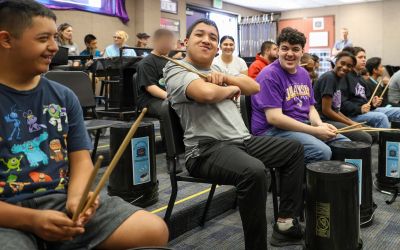
Creatively Reach Special Needs Students
A California music educator offers special education students musical opportunities, using different and effective approaches.
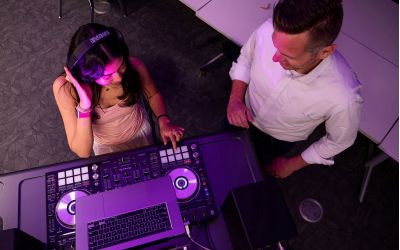
The Nontraditional “Non-Semble”
A Wisconsin music educator uses nontraditional music ensembles to reach more students

The Power of Problem-Solving
Making modern music bridged COVID learning to a new co-curricular digital music program at a Pennsylvania school district.
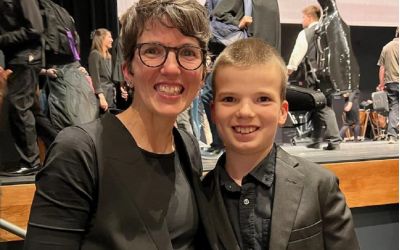
Make Concerts Memorable and Fun
A South Carolina orchestra director uses creativity to engage her students and the audience.
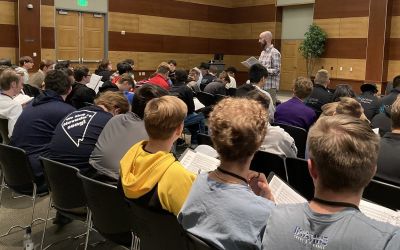
How to Effectively Partner with School Administration
Fostering a close-knit teacher-administrator relationship will pay dividends for your music program.
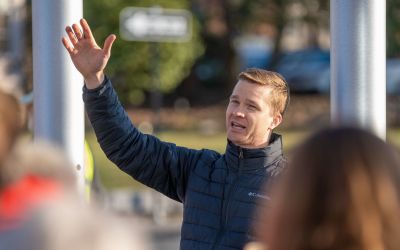
Connecting Music and Peace
At Eastern Mennonite University, students can earn a new degree that combines music education with diplomacy.
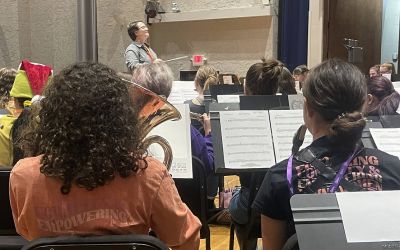
A Symposium for Women Musicians
How a Girl Scout project became the impetus for an annual all-women honor band concert for states in the Southeast.
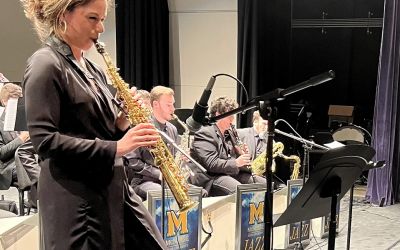
Empowering Women in Music
An educator’s journey to inspire future generations by celebrating and showcasing the successes of women composers and musicians.

The Magic in the Details
An Indiana music educator overcomes obstacles and fosters excellence in WGI.
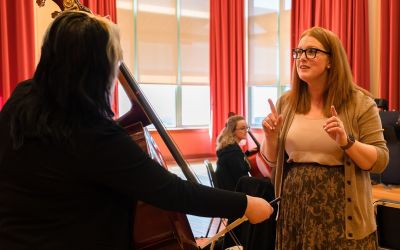
You Will Never Feel “Ready,” But You Can Be Prepared
Nine recommendations for music education majors and novice in-service music educators to hone their skills.

Use Music to Connect with Students of All Ages
An adjunct professor at George Mason University helps music education majors as well as children around the world to communicate through music.
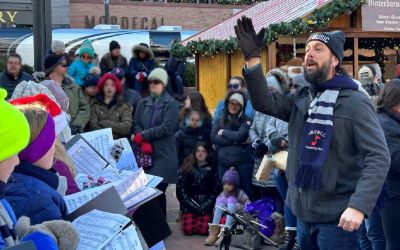
Overcoming Performance Anxiety
Earning trust and treating elementary students with respect are key to helping them perform with pride.

Essential Tips for First-Year Music Educators
The 2024 “40 Under 40” educators offer must-do and must-try tips to new music teachers to help them through their first year of teaching.
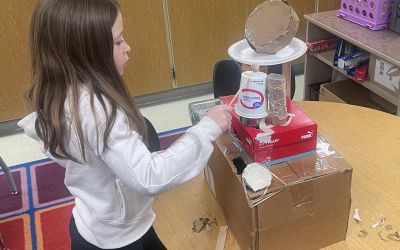
Teaching for Artistic Behavior
TAB pedagogy may look like chaos, but it’s a unique teaching methodology that allows student-led creative exploration.
40 Under 40 — Nominate a Deserving Music Educator Today!
Yamaha wants to recognize and celebrate the top 40 music educators under 40 years old. Nominate an exceptional music teacher today!

An Afro-Centric Curriculum Promotes Excellence
At Grace M. James Academy, a middle school for girls in Louisville, Kentucky, the orchestra director explores a unique strings education methodology.

Interdisciplinary Development Between the Arts
West Covina High School’s Performing Arts Academy allows students in music, dance and theater to hone their skills across disciplines and work together.
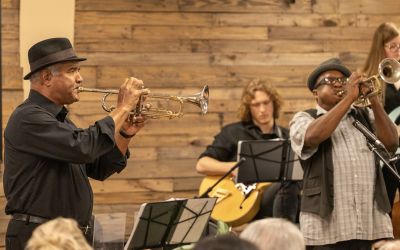
Incorporate Jazz in Your Classroom Daily
To keep a band program moving forward, you must capture the attention of young people. One way to do this and to increase retention is to integrate jazz into the curricula.
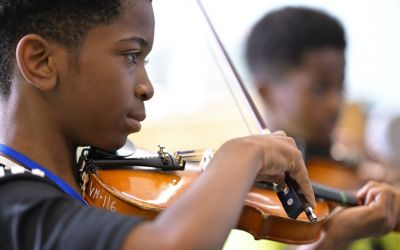
Play on Philly: A Model of Excellence
Underserved pre-K-12 students in Philadelphia can receive classical, tuition-free music education that balances fun and high expectations — and the results are phenomenal.

Becoming the Passionate Black Educator
A Tennessee educator decided to tackle systemic racism in music programs and is now a sought-after advocate to help schools and organizations around the country implement anti-racist, healing-centered music curriculum.

6 Steps to Incorporate a Growth Mindset in your Classroom
A Florida music educator embraces the concept that students, when faced with challenges, can improve their abilities not only in music but in everything they do.
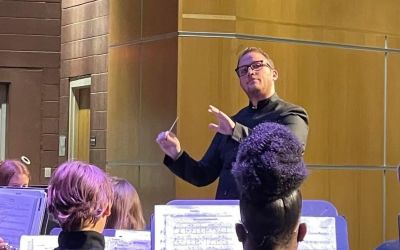
Putting Power into Students’ Hands
Through a method called Gradual Release of Responsibility, a South Carolina music teacher helps students develop critical thinking and leadership skills.
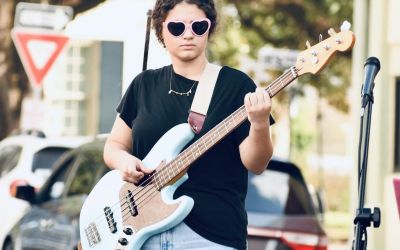
Cultural Crusader
By digging into her roots, a Louisiana music educator is nurturing future generations to keep the local culture of Cajun and French Creole music alive.
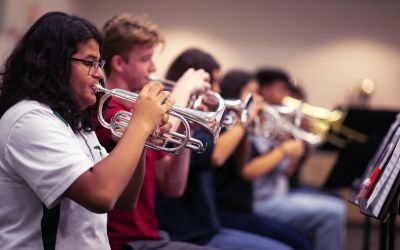
8 Unconventional Rehearsal Tips
Try these tips to challenge your students to listen, react, communicate, perform and ultimately, to be musical!

Teach Holistic Music Literacy, Not “Button-Pushing”
Focus on teaching music as a language and give students the skills to develop fluency in improvising, reading notation, composing and audiation.

How to Design a Marching Band Show
Good show design is an asset to any band program. Don’t get lost in the pursuit of excellence. Focus on delivering a positive and life-changing marching arts experience to your students!
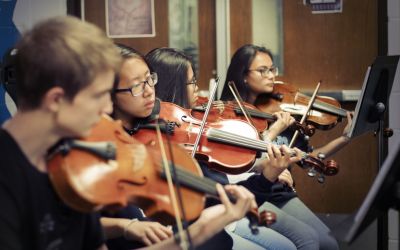
5 Recruitment Tips You Must Try!
Recruitment is a big part of ensemble directors’ jobs. Don’t look at it as a burden, but rather as a way of turning potential students into “our kids.”
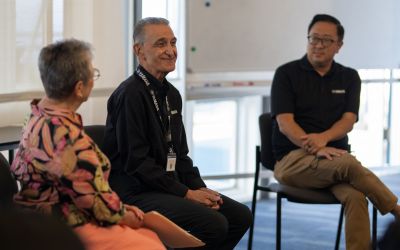
RAMP: A Summer Camp for Music Teachers
Learning through action is a core philosophy for a new professional development conference for music educators that takes place alongside a music camp for students.

Be an Effective Teacher-Leader
Be an agent of change, advocate for the true purpose of education, take initiative to solve problems and share your experiences with other educators.








